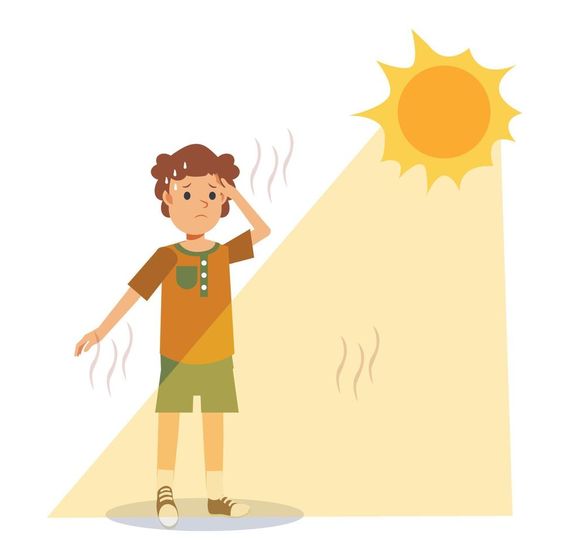Introduction
As the temperature rises during hot summer months, extreme heat poses significant health risks. In this blog, we will discuss the dangers associated with extreme heat and provide essential tips recommended by experts to avoid heat-related illnesses and injuries. Staying informed and taking precautionary measures can help you and your loved ones stay safe and healthy during scorching heatwaves.
Understanding the Impact of Extreme Heat
Extreme heat is not merely uncomfortable; it can be deadly. Prolonged exposure to high temperatures, especially during heatwaves, can lead to heat-related illnesses, including heat exhaustion and heatstroke. These conditions occur when the body’s internal temperature rises to dangerous levels, overwhelming its ability to cool down through sweating.
The Vulnerable Groups
Certain groups of people are more susceptible to the effects of extreme heat, including:
1. Elderly Individuals
Elderly individuals often have reduced sweating capabilities and may be less aware of changes in their body temperature, making them vulnerable to heat-related illnesses.
2. Children
Children’s bodies generate more heat than adults, and they are less efficient at cooling down, making them at higher risk during extreme heat.
3. Individuals with Chronic Health Conditions
People with chronic health conditions, such as heart disease and respiratory issues, may have a harder time coping with extreme heat.
4. Outdoor Workers
Those who work outdoors are exposed to higher temperatures for prolonged periods, putting them at risk of heat-related illnesses.
Tips for Avoiding Heat-Related Illnesses and Injuries
Taking precautionary measures can help prevent heat-related health issues. Experts recommend the following tips:
1. Stay Hydrated
Drink plenty of water throughout the day, even if you don’t feel thirsty. Avoid beverages that contain caffeine, alcohol, or excessive sugar, as they can contribute to dehydration.
2. Dress Appropriately
Wear lightweight, loose-fitting, and light-colored clothing to help your body stay cool. Use wide-brimmed hats and sunglasses for added protection from the sun.
3. Limit Outdoor Activities
Minimize outdoor activities during the hottest parts of the day, typically between 10 a.m. and 4 p.m. If you must be outside, take frequent breaks in shaded or air-conditioned areas.
4. Stay Cool Indoors
Spend time in air-conditioned places, such as shopping malls, libraries, or community centers, to escape the heat.
5. Use Fans and Cool Showers
Use fans and take cool showers to help lower your body temperature and provide relief from the heat.
6. Avoid Hot Cars
Never leave children or pets unattended in a parked car, as the interior temperature can rise rapidly and lead to heatstroke.
7. Check on Vulnerable Individuals
Regularly check on elderly family members, neighbors, or friends to ensure they are coping well with the heat.
Recognizing Heat-Related Illnesses
It’s essential to recognize the signs of heat-related illnesses to take prompt action:
Heat Exhaustion
- Heavy sweating
- Weakness
- Dizziness
- Nausea or vomiting
- Muscle cramps
- Headache
If someone shows signs of heat exhaustion, move them to a cooler place, offer water, and apply cool, wet cloths to their body.
Heatstroke
Heatstroke is a severe condition and requires immediate medical attention. Signs of heatstroke include:
- High body temperature (above 103°F or 39.4°C)
- Rapid and strong pulse
- Confusion or unconsciousness
- Hot, dry, or flushed skin
If you suspect someone has heatstroke, call emergency services immediately and move them to a cooler place while waiting for help.
Conclusion
Extreme heat can be life-threatening if proper precautions are not taken. To protect yourself and your loved ones during hot weather, remember to stay hydrated, dress appropriately, limit outdoor activities, and seek cool indoor environments. Keep an eye on vulnerable individuals, and be vigilant about recognizing the signs of heat-related illnesses. By following these expert tips, you can ensure a safe and enjoyable summer without falling victim to extreme heat.
FAQs
- Who is at higher risk during extreme heat?
- Elderly individuals, children, people with chronic health conditions, and outdoor workers are at higher risk during extreme heat.
- What are the signs of heat exhaustion?
- Signs of heat exhaustion include heavy sweating, weakness, dizziness, nausea or vomiting, muscle cramps, and headache.
- What is heatstroke, and how is it recognized?
- Heatstroke is a severe condition characterized by high body temperature, rapid pulse, confusion or unconsciousness, and hot, dry, or flushed skin.
- What should I do if someone shows signs of heatstroke?
- If someone shows signs of heatstroke, call emergency services immediately, move them to a cooler place, and provide water if possible.
- What are the best ways to stay cool during extreme heat?
- To stay cool during extreme heat, stay hydrated, dress in lightweight and loose-fitting clothing, limit outdoor activities, and spend time in air-conditioned places when possible.

